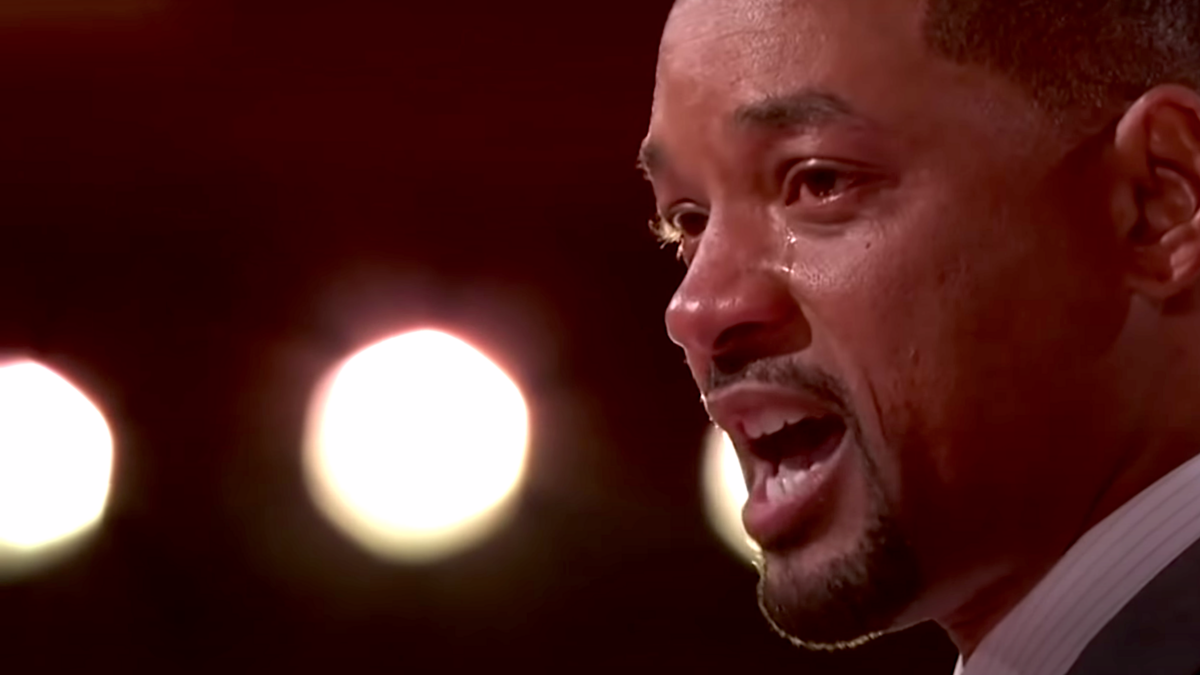Bona fide movie stars saved the Oscars—and they weren’t working off a script either. When he slapped Chris Rock live on stage, Will Smith produced a genuine, Kanye-at-the-VMAs water cooler moment. But, of course, our water coolers are now Slack chats and most people saw the moment on social media.
Think about this: The infamous 2009 Video Music Awards drew about 9 million viewers. That’s roughly the same as last year’s Oscars, meaning the country was almost certainly pretty tuned out when Smith’s hand came down on Rock’s cheek. From the live broadcast, bleeps made the moment hard to discern anyway, leaving people to wonder if it had been scripted. Immediately, however, uncensored footage and reports from backstage trickled onto social media, clearly showing otherwise.
Just as the country began debating whether Smith acted virtuously or petulantly in defense of his wife, the star of “King Richard” was crowned Best Actor. It was surreal television, watching an icon process an iconic mistake on an iconic platform. Smith should have taken the joke like Rock took the slap—it was nothing worse than your average Joan Rivers quip—but his acceptance speech framed the masculine outburst poignantly as the unfortunate consequence of a husband’s unrestrained protective impulse.
If anything, masculine mistakes in Hollywood are most often borne of disloyalty and unfaithfulness, going without apology or remorse. Smith’s rapid correction served in real time as a difficult display of healthy masculinity, and at the Oscars of all places. He gave our pop culture some life.
As is the case every year now, the Academy sought haplessly to make its three-hour back pat more palatable. The hosts fumbled their punchlines and fought the teleprompter. As a trio, Wanda Sykes, Regina Hall, and Amy Schumer managed to land a few good jokes between cringe-inducing political potshots. (Schumer handled the Smith moment deftly.) They showed clips of Marvel movies and celebrated Hollywood classics.
The broadcast still dragged. As a production, it was at least high-energy and colorful, marking a small step in the right direction for an Academy that wants to keep bringing in ad money. But the reason Smith captivated the country is also the reason awards shows are in trouble.
Movie stars on average are dimmer than they used to be because we have more choice. On screen, our raw emotions are filtered through unimaginative ideological lenses. Of course, anyone slapping anyone live on stage at the Oscars is a big deal, but an A-List actor slapping another A-List actor then picking up the top award in his field is on another level.
Award shows are like reality television. The public watches celebrities react in high drama moments, waiting for glimpses of their humanity. That’s less powerful when there are fewer Will Smiths, true kings of popular culture, and when social media sucks the mystique out of celebrity, for better or worse.
There are fewer Will Smiths and Chris Rocks because Hollywood’s business model is adapting to the splintered streaming landscape, which is also why the Oscars have recently celebrated fewer blockbusters. Niche movies create niche celebrities, which perpetuates the vicious cycle of siloed culture: How can you create unifying art if you’re unfamiliar with what would actually unify audiences? We’re spiraling quickly down that route.
So should the Oscars just do everything to ensure every film and fashion buff tunes in, assuming the show may never do much better than 10 million viewers again? Or should they try to recover their place in pop culture as one of the few truly massive television events Americans watch together? You could lose a lot of money trying to do the latter.
For the Academy, the lesson of 2022 is that Will Smith is an American icon. Their show shaped our culture because of his star power. His star power exists because people of all different backgrounds like his work. If the Oscars and the industry they honor don’t heed that lesson, in 2032 we’ll be watching five-hour foreign films win every award while ephemeral YouTube influencers kick each other in the shins to sell more FitTea.
Judging by the rest of the show, we might as well get ready to drink a lot of FitTea.









